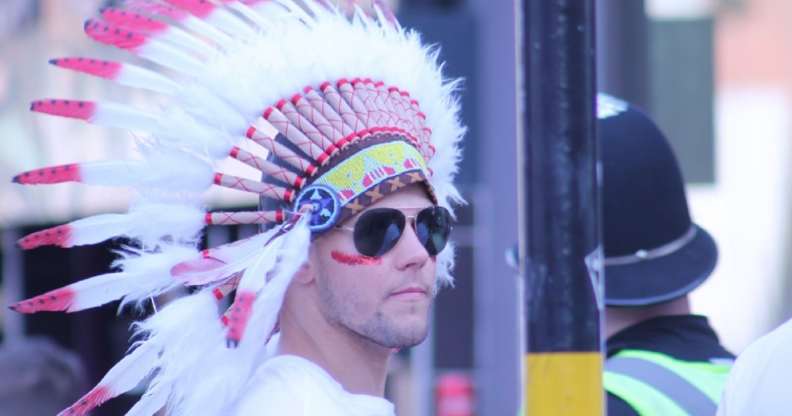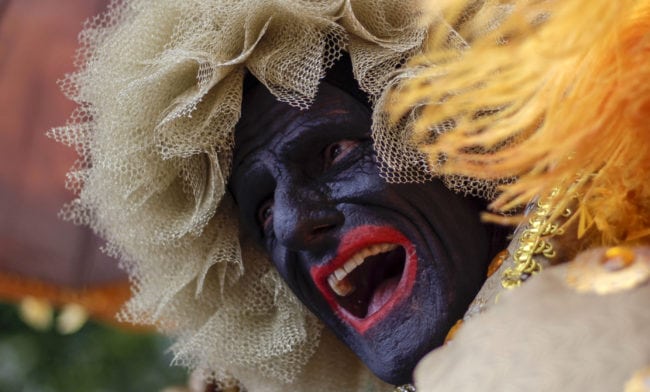Activists call for ban on ‘cultural appropriation’ at Pride parades

A group of LGBT activists are calling for Pride events to implement a ban on ‘cultural appropriation’ and Native American headresses.
Campaigners in Birmingham, UK, have expressed anger after people in Native American costumes took part in the city’s Pride parade on May 26.
Some have called on organisers to outlaw outfits deemed cultural appropriation as well as other racially-insensitive costumes.
Speaking to I Am Birmingham, bisexual Muslim activist Harry Alimo said: “I think people need to understand that if they’re going to take from another culture, they need to understand the cultural significance of what they’re taking, and have to ask if it suits the purpose of what they are doing with this culture.
“Are they just turning up to a kind of ‘Halloween’ thing, just because, or are they sharing the historic context of that thing?
“I think they’re exacerbating their own privilege because they feel they can get away with it and nobody will say anything, and even if someone does say something, it’s only us criticising them, it doesn’t change the power dynamic.”
Alimo added:”We need people to call out cultural appropriation, ask people why they’re doing it; and if it’s not cultural appreciation then it’s cultural appropriation and cultural ignorance.
“I agree, coming from the stance that we should ban it because of the racism within Pride, but I also understand that it kind of goes against freedom of speech where people express themselves in stupid ways for stupid reasons; and need educating.”

A reveler gestures during the 22nd Gay Pride Parade, in Sao Paulo, Brazil on June 03, 2018. (MIGUEL SCHINCARIOL/AFP/Getty)
Suriya Aisha of UNMUTED, a Birmingham network for LGBTQI people of colour, told I Am Birmingham that the outfits were unacceptable.
Aisha said: “I think Birmingham Pride has deeper and wider systematic things to face of which cultural appropriation is one of the things on the surface.
“So whilst I think banning cultural appropriation is a good idea. Really, there needs to be deeper work done by the pride organisers to raise awareness and visibility of issues other cultures and nationalities faces as LGBTQI, so that a ban isn’t tokenistic.
“I would encourage Pride to gather feedback and evaluation from the people of Birmingham and beyond to see if the pride festival reflects their city. An event or product that doesn’t think about all of the audience it is trying to serve isn’t sustainable.
“I want Birmingham Pride to work harder at centring the Pride festival around those still most marginalised in the LGBTQI community, who are people of colour, asylum seekers, trans people and those with illnesses and disabilities; remembering Pride’s protest roots.”

Out Olympic Skier Gus Kenworthy apologised for wearing a Native American costume in 2015
Birmingham Pride has responded to the calls.
Event director Lawrence Barton told I Am Birmingham: “Birmingham Pride is against cultural appropriation completely, without exception and does not condone it in anyway shape or form.
“We will take steps to ensure staff are better trained and educated to make a judgement as to what is and what isn’t offensive or acceptable.
“Whilst we do not condone cultural appropriation in anyway, we also have to consider what could have been a completely innocent oversight on the part of the wearer.”
Journalist Harvey McDonald said: “It’s good to know that the Birmingham Pride team are aware of cultural appropriation and do stand against it. There would have been a time not so long ago when even that would have been an ask.
“It’s also promising that they are addressing the issue through staff training. But will they take effective enough action? I think it’s time they addressed the issue head-on, as many in the community expect.
“In the same way much larger events such as Glastonbury Festival have successfully dealt with the issue. Could Birmingham lead the way for other Pride celebrations across the country in adopting a more progressive approach? One suited to the social and equality movements of the 21st Century?
“It’s time Birmingham Pride reflected its key communities and audience, and banned offensive racially stereotypical costumes from an event traditionally celebrating the fight against oppression.”

